Long before the events of Oct. 7, Jeffrey Wilkinson and Raja Khouri were thinking about how to bring understanding between Jewish Israelis and Palestinians. Both groups are victims of immense trauma that dictates how they see each other, preventing them from listening to one another, the authors contend.
Wilkinson, an American-born Jew, and Khouri, born in Lebanon to Palestinian parents, found each other through their human rights work here in Canada.
Khouri was the founding president of the Canadian Arab Institute and is a former commissioner with the Ontario Human Rights Commission, while Wilkinson is an educator and researcher working predominantly within the Jewish community around trauma and the long-standing Israeli-Palestinian conflict.
When their book The Wall Between: What Jews and Palestinians Don’t Want to Know about Each Other came out on Oct. 1, the co-authors thought their book tour would be about building bridges between their two communities.
That assumption lasted only six days.
“There’s less of an appetite in both communities to talk to each other” following the Oct. 7 Hamas attack on Israel and the Israeli war on Gaza, Wilkinson says.
“It has altered the tone of our message. We put a higher premium on justice, on stopping the violence so that we can get back to talking to each other.”
If the speed with which tickets for their upcoming Vancouver talk on June 13 sold out — a new venue was selected to allow for more tickets and there is also a livestream option — is any indication, people have an appetite for what they have to say.
The Tyee interviewed Khouri and Wilkinson about their book, how their message has evolved since the war began and why shared values bring them hope for the future of both the Middle East and the world. This interview has been edited for length and clarity.
The Tyee: How has Hamas’s Oct. 7 attack, and Israel’s subsequent war in Gaza, impacted the views you expressed in your book?
Raja Khouri: Our views have been affirmed. Because the way the communities reacted to the events was exactly as the way we describe it in the book. Trauma made Oct. 7 feel like another Holocaust to many Jews. And the Gaza assault and the migration felt like another Nakba to Palestinians. The way the bad actors, the advocacy groups, attacked each other, attacked the communities and contributed to the demonization of the other is also the way we describe it in the book.
Jeffrey Wilkinson: I totally agree. Certainly for Palestinians to sit around a table and talk about how Jews are feeling when there are bombs being dropped on them doesn’t seem fair to ask of anyone. We found our book has been sadly very prophetic. And our message has shifted somewhat.
Usually when people talk about bad actors, they mean Hamas or the Israeli government. How are the advocacy groups the bad actors?
Wilkinson: We call them “BADD actors” in the book. These are groups in Canada and the U.S. that all they do is blame, attack, demonize and dismiss. These are the local bad actors.
Khouri: Some of them do co-ordinate with the “BADD actors” over there. But the focus of our book is the diaspora and how the communities here react to each other. And we talk about two primary motivators. One is trauma. And the other one is these “BADD actors” that manipulate the trauma for their own ends. They’ve become professional bad actors, because they created this industry and it’s doing a lot of damage to our society, social cohesion and ability to coexist. Demonizing the other is never a recipe for good things.
Wilkinson: There’s an emotional and political purpose for this demonizing. The emotional purpose is to keep us centred on what happened to us so that we don’t look at what happened to them. And the political purpose is so that we stay with the team, don’t veer from the message of who we’re supposed to be for and who we’re supposed to be against.
Khouri: Stay with the tribe. The tribe that gives us protection, because these “BADD actors,” they get their money from the tribe.
How has your message shifted following Oct. 7?
Wilkinson: Two things shifted in the first few months after Oct. 7. The people who came to our talks [at first] were largely not members of either group. Both groups went to their corners, in a sense, for very understandable reasons. So our message was to people who wanted to understand better.
In the last few months, we’ve had events that have many Jews, many Palestinians. We’ve put a larger focus on having to recognize the daily pain of Palestinians having calls from families in Gaza about loved ones that have died or were moved. So there are certainly talks that we give that are more focused on that, and less focused on typical bridge building.
That doesn’t mean that our ultimate goal has changed at all. It’s just that the moment has required us to really recognize that when someone’s in pain, their pain needs to be acknowledged before they’re going to do anything else.
How do you respond to people who see your premise as “both sides”-ing a really unequal conflict?
Khouri: We don’t see hierarchy in trauma. Trauma is strong. We talk about the primary Jewish trauma being the Holocaust, and the primary Palestinian trauma being the Nakba. We spend quite a bit of time in the book talking about how these sorts of overarching subjects are always at the heart of how people react.
When you say “Israel” to a Palestinian, it doesn’t go down easy, because Israel is 1948. What’s important about 1948 is that it remains something that the world, particularly the West and certainly Israel, have not recognized. Even progressive Zionists will try to blame 1948 on the Palestinians, rather than taking responsibility for the actions that the Zionist movement at the time did that led to the dispossession of the Palestinians: losing their homes, their society, their identity.
Wilkinson: From a Jewish perspective, it’s very important to make a difference between how and what causes someone suffering, and the impact of the relief of that suffering on someone else. What we clarify in our work is that while there is a gigantic chasm, a differential in power, that one side has the ability to change things and the other doesn’t, there’s no hierarchy to misery. One of the key stumbling blocks to progress has been that very understandable reluctance on behalf of Arabs, Palestinians and their supporters to recognize the Holocaust and Jewish trauma, even though they had nothing to do with it. You can’t understand why a Jew needs Israel without understanding Jewish trauma.
What Raja has taught me is that he can hold that pain and anger at Zionism and still care about the pain of Jews. That’s really been lacking in both of our communities. For Jews, to recognize that Palestinian trauma appears like a threat to our safety. And that’s what we’re pushing up against.
Caring for the other is caring for yourself. Once we’re a bigger self, we’re much more powerful, more able to work together, more able to use a single voice.
But it’s hard to get people to see that. Certainly for me, fighting for Palestinian rights is not separate from fighting for Jewish rights. You can’t have one without the other.
Khouri: We’ve been hearing a lot about these student encampments on campuses, how some Jewish students feel unsafe. They see a sign that says “Free Palestine.” Because of the trauma, to them that means wiping out the Jews and Israel. To Palestinians, they’re talking about freedom, liberation. The trauma and the disinformation, the propaganda, are two things that guide 99 per cent of the way people react.
How do you bring groups of people with such divergent views together?
Wilkinson and Khouri, together: Values.
Wilkinson: [Laughing] You owe me a Coke, buddy. Finding common ground in our values. There’s this idea that the things happening on campuses are these outrageous, angry statements that are making Jews upset. The values that these students are promoting are western values we’ve taught them.
I’m not talking about someone who says a hateful, antisemitic statement. But wanting the violence to stop, ceasefire, organizations to divest from companies supporting the Israeli military — these are western values of decency, respect, value for all human life.
We lose sight of our core values. We talk about who is right instead of what is right. And that’s the shift that Raja and I engage with people. We call on them to stop blaming. We could sit here forever and have a list of whose fault everything is. It’s not getting us anywhere.
North America is also colonized by Europeans. I hear a lot about how the creation of Israel is colonialism. Is there a difference between that colonialism and colonialism here? And is it important to make a distinction?
Khouri: There is a difference in the sense that there wasn’t a country in Europe called Israel that sent armies to colonize Palestine. The Zionist movement wanted to create a Jewish majority state in Palestine. And over time, it managed to do that, especially [after] the Holocaust that caused mass migration from Europe, where no one wanted the Jews, so they ended up going to Palestine.
To Palestinians, there is no difference, the impact is the same. It is the classic impact of colonialism, which is dispossession, ethnic cleansing, all of those things.
Wilkinson: The term “settler colonialism,” like “genocide,” is a trigger for many Jews, because they see themselves as the victims, rather than the perpetrators. So what we do in human rights work is to focus on exactly what Raja said, impact. And the impact on Palestinians is totally akin to settler colonialism.
For most Jews, Zionism is a project of reclamation, freedom and safety. Many Jews are not able to see the impact on Palestinians; we say to understand Zionism, you have to think of jumping out of a burning building and landing on someone else’s head. Jews tend to be concerned with the burning building and not the head of who we landed on.
For Raja and I, our values teach us to be concerned about the building and the people we landed on.
Each side claims to be silenced in the media, both here and abroad. What are you seeing?
Khouri: That’s been the case for 80 years. Each side thinks that the media is biased against them. Watch CNN for 15 minutes reporting on Gaza and you can tell where the media is. CNN covers Israelis “killed” by Palestinians, while Palestinians “died.” I don’t know if that’s still the case, Jeff, they’ll bring in Israeli military experts to explain what’s happening in Gaza.
Wilkinson: They don’t do it as much anymore.
Khouri: But they did that for a long time.
Wilkinson: A long time.
Khouri: Now the difference in the younger generations’ thinking is because they don’t really get the news from CNN. They get it from Palestinians on the ground while they are going through the rubble and finding bodies or pieces of bodies. That’s part of the reason you’ll see a difference in attitude among younger and older Canadians.
Wilkinson: It’s always easy to blame the media for things. Media is an economic entity. And the fact that most mainstream media tend to tell a more pro-Israel position is because the majority of Americans and Canadians hold a more pro-Israel position. And certainly the body politic in Canada and the U.S. very much hold a pro-Israel position. They’re not makers of our consciousness; they’re reflectors of it.
How are your own communities responding to your book and you as individuals since Oct. 7?
Wilkinson: There is no doubt that I’ve been an outlier for a long time. But Oct. 7 was a breaking point. I maintained relationships up until then that I haven’t been able to maintain since. The trauma was so immense for many Jews that the very fact that I even suggested that we must also consider the causes of Oct. 7 was seen by the majority of my community as a betrayal.
My views are largely guided by my Judaism. I’m proud of what Judaism has taught me, of how I reflect our community. And I hope, over time, more and more of my community will come closer to where I am. Because I think that the next wave of Jewish renaissance in North America needs to be centred more in our values of social justice, that have always guided Jews, and less about our trauma and our victimhood.
This is what our young people are teaching us: they are tired of just hearing about the Holocaust. They’re more shaped by their social justice values, human rights values. They care about their families, about the Holocaust, but they don’t want to live there anymore. That’s what our message is.
Khouri: Jeff and I came together because of our shared values. After Oct. 7 we were asked, “How does that impact your relationship?” It hasn’t changed a thing, because our values are solid and we are true to them. Key among those values is intellectual integrity and being driven by values rather than by interests. Jeff arrived at his values through his Judaism; it got me liking Judaism. This Palestinian likes Judaism because it’s what brought me and Jeff close together.
In terms of reactions, the Palestinians now are not in a forgiving mood, not in an understanding mood. They’re angry, they’re upset, they’re hurting. When I speak, when I write something in the papers like I did last week in the Globe and Mail, it was about the Nakba and how that relates to the moment. Some people say, “You were too soft in this article.” They want anger, they want me to be a “BADD actor,” to make Israel look bad, to make Jews look bad. My article did not shy away from the history. But it’s not going to satisfy someone’s anger and hurt because it is not an angry piece.
Anger, unfortunately, has become a defining part of Palestinian identity, because it’s been 80 years and the injustice continues. The West remains solidly beside Israel. Palestinian human life is not valued as much as western or even Jewish Israeli life. They see hypocrisy. There are many reasons to be angry. I’ve chosen a different path. That doesn’t mean I don’t get angry. But I don’t act on my anger. I don’t get the kind of reaction that Jeff gets from his community.
Wilkinson: You get some people who don’t like you talking to Zionists.
Khouri: My response to them: “Who else I’m going to talk to?” You talk with the people that you have a problem with to see what we can do about it. But I know where they come from. Talking to Zionists, to them, gives credibility to Zionism, and Zionism equals Israel and Israel equals dispossession. I chose to go differently about dealing with it.
There have always been protests against Israel’s actions in Palestine, but they really have ramped up since Oct. 7 and the retaliation following Oct. 7. What’s changed?
Wilkinson: It’s a conflagration. Young people — particularly college- and university-educated young people — see Israel through a settler-colonial framework. Very much like Canada or the U.S., they see it as a white colonial power that is dominating a subaltern group. Nuance about Jewish trauma is lost on a lot of them. Take that groundwork that’s already been there for quite some time, and then you add the daily assault on dignity that they’re watching on their phones. It’s enraging. It’s enraging and devastating for us, and we build bridges all day.
The two of those things together were a perfect storm. All of it is really sparked by the fact that our body politic has not led us in a proper way. We’re about self global interest, who our allies are and who they’re not. We have a level of built-in xenophobia towards brown Arabs and Muslims in Canada and the U.S. Jews look more like us. We feel more akin. Our student population that is growingly more immigrant, more brown, is saying this doesn’t represent our values, who we are.
Khouri: And this comes also on the tail of the justice movement that started with Me Too, Black Lives Matter, Indigenous justice and reconciliation, climate justice. And for the first time I think in North America, there is a sizable group of people who don’t see this as a Palestinian-Israeli conflict. They see this as a human rights issue where Palestinians have been oppressed, both inside Israel and in the West Bank and Gaza, for decades.
This awakening towards justice, I’ve never seen anything like it. The Palestinian flags flying on campuses across the continent. Young Jewish students sitting in tents with Palestinians and Muslims, asking for Palestinian rights to be respected. This is all unprecedented.
The political establishment hasn’t caught up yet with this, but in time they will. The anti-apartheid movement did not materialize and succeed overnight. These student encampments have a lot of parallels to the anti-apartheid movement and the anti-Vietnam War movement. I’m very hopeful about these students. And I’m really upset that many have reacted to them as these thugs who are occupiers and they are antisemitic. They’re calling for justice for Palestinians.
Wilkinson: For decades now opposition to Zionism, to oppression of Palestinians, has been framed as antisemitism. So they feel this double whammy. The people are being oppressed, and then they’re being re-oppressed by being told they can’t talk about it. That is adding a lot of fuel to the fire.
What can people expect at your Vancouver talk?
Khouri: Our events have been fantastic; people are there because they’re fed up with the status quo, the violence, the killing. They’re fed up with the fascist government in Israel. They’re fed up with Hamas and its extremist methods. And they saw how bad things can get if we just continue the status quo. So they come looking for hope, for understanding, for a better way for us to interact, to relate to each other.
It’s been really heartwarming how appreciative people are of our message. Occasionally we get a standing ovation, and we look at each other, saying, “They’re giving us a standing ovation? What did we do?” [Laughs]
Wilkinson: We’re offering them hope in a really dark time.
Khouri: And an alternative, right?
Wilkinson: An alternative, yeah. People come to our events from all walks. If they ask a question or make a comment that reveals their pain, their trauma, we empathize with them. We offer them a pathway to not be threatened that there’s another trauma.
I learned about my tribe’s pain, and I didn’t feel threatened when I learned about Raja’s. I felt included. I felt energized, that we could use pain and trauma for good if we came together. We cared about each other, we listened to each other.
What makes you interested in us, after talking to us for 45 minutes?
Hope. Hope and understanding.
Khouri: We live in a highly polarized world, and this is one of the most polarized subjects. Our aim is to bring the tension down a few notches, reduce the polarization, the binarism that we’ve seen, especially since Oct. 7, where you’re either with the terrorists or you’re with the genociders, you have to pick a side. That’s all stuff that we are absolutely against.
We encourage people to struggle with what they’re feeling. Because if you’re not struggling, and you’re sure of how you feel or how you think, then you must be missing a big part of the picture.
Wilkinson: To know you don’t know, is the secret to know. ![]()
Read more: Books, Rights + Justice
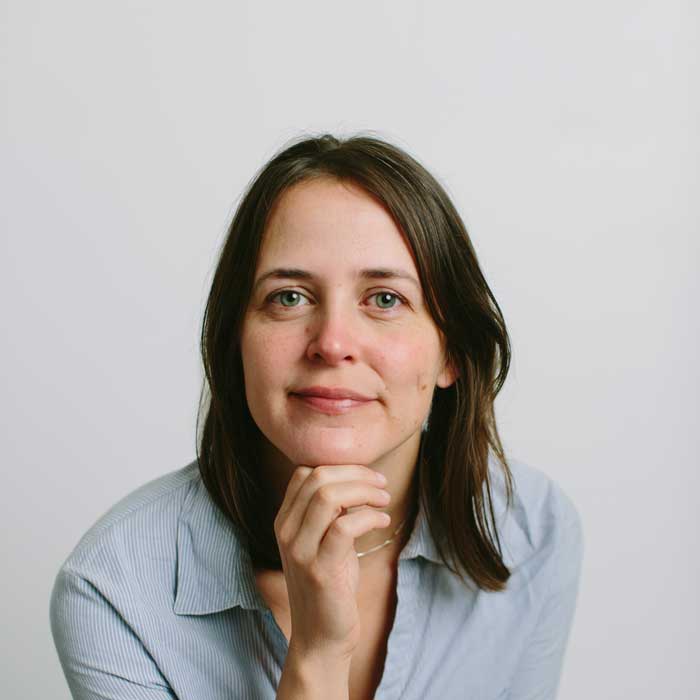

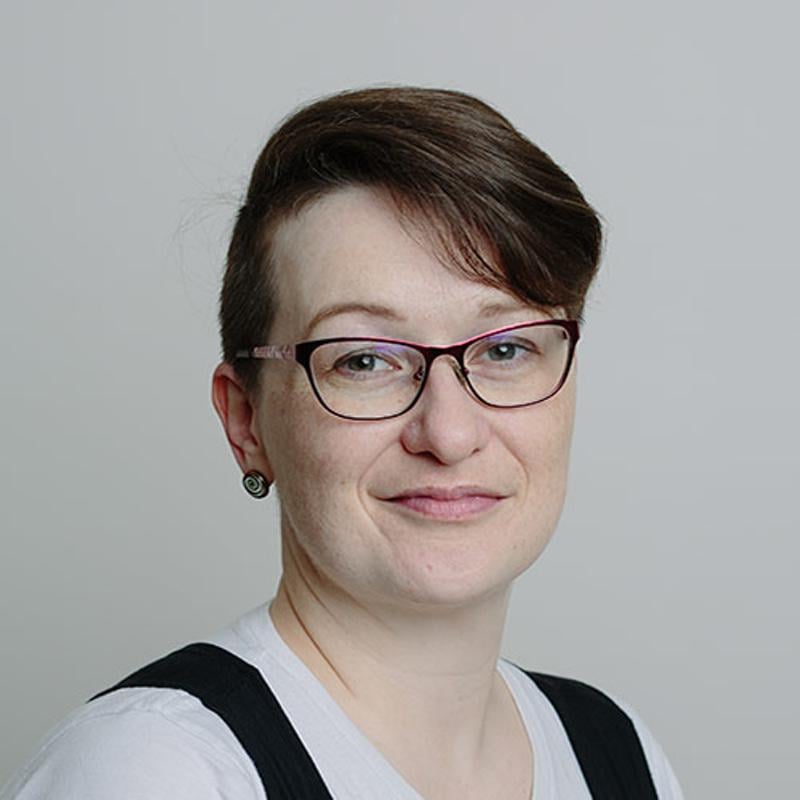

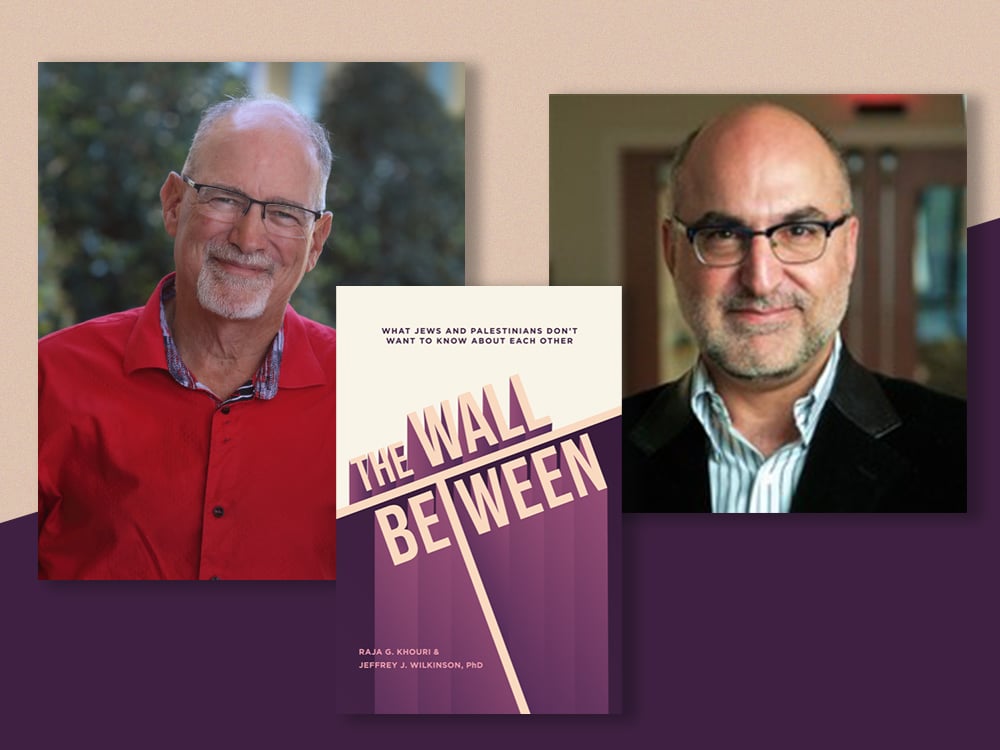
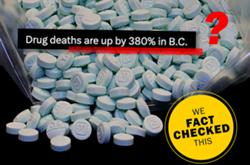
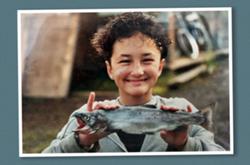
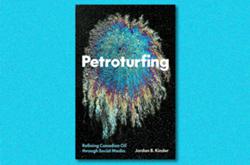
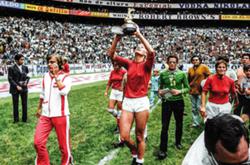
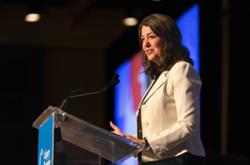

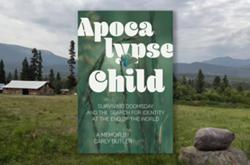
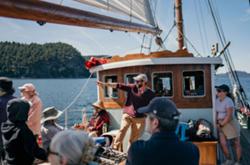
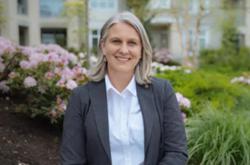

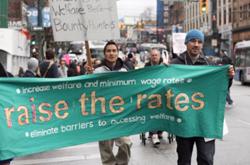
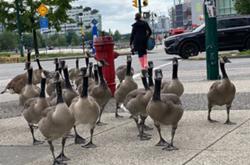
Tyee Commenting Guidelines
Comments that violate guidelines risk being deleted, and violations may result in a temporary or permanent user ban. Maintain the spirit of good conversation to stay in the discussion and be patient with moderators. Comments are reviewed regularly but not in real time.
Do:
Do not: